- Home
- Robert Goddard
Hand In Glove - Retail Page 13
Hand In Glove - Retail Read online
Page 13
Derek opened and closed the creaky front gate in a furtive manner which he knew would arouse the suspicion of anybody watching from the house but which he was powerless to control. He would have given a great deal to be able to turn back there and then, but the recollection of Colin’s sneering expression drove him on to the sunburst front door and a reluctant stab at the bell-push.
Two loud rings brought no response. Squinting through the frosted glass, Derek could see nothing beyond a blurred and empty hallway. Mrs Mentiply was clearly not at home. He would have to try again later – or abandon the whole idea. He turned to go. Only to pull up instantly at the sight of a man watching him from the corner of the house.
‘Oh!’ said Derek. ‘Hello.’
The man nodded. He was a thin, grey, mournful-looking fellow in a tattered warehouse coat. Both the coat and his hands were smeared with dirty oil. In one hand he held a spanner, in the other a cigarette.
‘Er … I was looking for Mrs Mentiply.’
‘The Missus is at church.’
‘Ah. When is she likely to be back?’
‘When the vicar runs out of things to say. But what do you want with her?’
‘Well … Mr Mentiply … I …’ Derek moved towards the man, smiling nervously. ‘My name’s Derek Fairfax.’
‘Fairfax? No relation to the bugger they got for doing in Miss Abberley?’
‘My brother, actually.’
‘Is that a fact?’ Mentiply grinned mirthlessly. ‘Well, the Missus won’t thank you for dropping by, I can tell you. She worshipped the old girl.’
‘I only wanted to ask her a few questions.’
‘What about?’
‘About whether anything unusual happened in the weeks prior to Miss Abberley’s death.’
‘Anything not involving your brother, you mean?’
‘Well … Yes.’
Mentiply took a drag on his cigarette and coughed expectorantly. ‘You can wait for her if you like.’
‘Thanks.’
‘But you’re wasting your time.’ With that, he turned on his heel and vanished from sight.
Belatedly, Derek realized he was meant to wait on the doorstep, not inside. After shifting awkwardly from one foot to the other for a minute or so, he made his way to the corner of the house. There was a garage between it and the boundary hedge, at the end of a cinder track. A battered old car was standing half in and half out of the garage, with its bonnet raised and Mentiply stooped over its filth-encrusted engine. Derek walked up to him.
‘Still here?’
‘Yes. I thought … since your wife’s not back yet …’
‘You thought what?’
‘Well, perhaps you know something.’
‘About Miss Abberley and her high-and-mighty family? What would the likes of me know?’
‘I believe my brother’s innocent, you see.’
‘Do you? That’s nice for him.’
‘It’s the week or so after his visit to Jackdaw Cottage on the twentieth of May I’m particularly interested in. It’s possible something happened during that period to worry Miss Abberley – something which could hold a clue to the identity of her murderer.’
‘Doesn’t your brother know who he hired to do it, then?’
‘He didn’t hire anybody.’
‘No?’ Mentiply abruptly gave up trying to shift a stubborn nut with a muttered, ‘Sod the thing’ and stood upright, wiping his oily hands in an equally oily rag. ‘Are you just shooting a line, son? Why that week especially?’
Mentiply’s sarcasm about the Abberleys and his sudden curiosity heartened Derek. ‘Because Miss Abberley telephoned my brother a week or so after his visit and said she accepted he hadn’t called on her under false pretences.’
‘Says who?’
‘The point is, Mr Mentiply, did something happen? Your wife might know without being aware of it.’
‘Doubtful.’ He frowned. ‘Would that week have included the bank holiday?’
‘Er … Yes. Yes, it would have. The last Monday in May. Why?’
‘Oh … Nothing.’
Derek willed himself to stay silent. It was the best way to encourage Mentiply to say more.
‘Except …’ He scratched his chin. ‘Funny, really. It was on the bank holiday. The pub was open all day. That’s how I remember. I’d seen him before, a couple of times, when Maurice condescended to pop round for a word with the Missus. But he’d been fired long since, I was told, and he certainly didn’t come from round here. So, it was odd. And it was him all right. I’d recognize him even without his uniform.’
‘Recognize who?’
Mentiply took a last draw on his cigarette, then flicked the butt past Derek’s chin on to the cinder track. ‘Maurice Abberley’s chauffeur. Used to drive him down here in his I’m-rich-and-you’re-not Bentley. Until he was given the order of the boot, some time last winter. Too fond of the bottle to drive for a living, according to the Missus. I suppose that tallies with where I saw him. Public bar of the Greyhound, bank holiday Monday afternoon.’
‘What was he doing there?’
‘Drinking.’
‘In Rye, I mean.’
‘Couldn’t tell you.’
‘Didn’t you ask?’
‘Oh, I asked. But he pretended he didn’t know me from Adam. Denied being Maurice’s chauffeur. Denied being anybody’s chauffeur. Suggested I was too pie-eyed to recognize my own mother. Bloody nerve!’
‘It does seem strange. What’s his name?’
Mentiply frowned. ‘Can’t for the life of me remember. Couldn’t at the time. If I had, I wouldn’t have let him get away with it so easily. What beats me is—’ He broke off at the sound of the gate being opened. ‘That’ll be the Missus,’ he said. ‘Avril!’
Mrs Mentiply materialized at the corner of the house, plump and matronly in her Sunday best.
‘Oh!’ she said. ‘You’ve got a visitor, I see.’
‘No. You have. Name of Derek Fairfax.’
‘Yes.’ Derek smiled awkwardly. ‘I … er … I’m Colin Fairfax’s brother.’
Mrs Mentiply coloured ominously. ‘Then you’re not welcome here.’ She glared at her husband. ‘I should have thought that was obvious.’
‘Don’t take on, Avril. I’ve just been trying to remember the name of Maurice’s chauffeur. The one he sacked for drunkenness.’
‘Why do you want to know?’
‘To help out this young fellow.’
‘Help him out? I can’t imagine what you’re thinking of, Arnold, I really can’t. As for you, Mr Fairfax—’
‘I’m sorry,’ put in Derek. ‘This is all my fault. Why don’t we—’
‘Spicer!’ exclaimed Mentiply. ‘That was the bugger’s monicker.’ He grinned triumphantly at Derek. ‘Mr Spicer, as Miss Abberley would have called him.’
22
MAURICE’S CAR WAS parked at a boldly nonchalant angle in front of the hotel. What its owner might be doing there Charlotte could not imagine. Suddenly, her thoughts were plucked away from Frank Griffith’s sombre reminiscences and deposited in the here and now of difficult questions and side-stepped doubts. She had anticipated having to explain herself to Emerson, but Maurice’s presence posed additional problems which transformed a delicate task into a formidable one.
They were in the lounge, relaxing over pre-lunch drinks. Neither displayed any sign of anxiety. Indeed, as Charlotte entered the room, they were laughing uproariously, like two old friends exchanging a joke. Then they saw her.
‘Charlie!’ said Maurice, jumping to his feet. ‘We were beginning to worry about you.’
‘There was no need.’
‘I expect you’re wondering what I’m doing here, aren’t you?’
‘Well …’
‘I phoned him last night,’ put in Emerson. ‘Thought I ought to bring him up to date.’
‘And I decided to join you here,’ said Maurice with a grin.
‘I was going to tell you this morning,’ Emerson
continued. ‘But you’d already gone by the time I came down for breakfast.’
‘I left a note for you.’
‘By which we’re both greatly intrigued.’ Maurice’s grin declined into the faintest of smiles. ‘What did this Griffith fellow have to say for himself?’
‘Quite a lot. Everything we wanted to know, in one sense.’
‘Does he have the letters?’ asked Emerson.
‘No. Not any more. Why don’t I explain over lunch?’
‘Do put us out of our misery first,’ said Maurice. ‘What has he done with them?’
‘He destroyed them. At Beatrix’s request.’
Emerson swore loudly and instantly apologized. ‘I’m sorry. News like this is a real body-blow to a biographer.’
‘I’m sorry too.’
‘Destroyed them,’ said Maurice musingly. ‘Well, well, well.’ Then he looked quizzically at Charlotte. ‘How, exactly?’
‘He didn’t say. Burned, I suppose.’
‘But you do believe him?’
‘Yes.’ Charlotte knew she should meet Maurice’s gaze as she replied, but something prevented her, something that turned what should have been a confident assertion into a stubborn protestation. ‘I believe him.’
Nothing Maurice and Emerson said during lunch implied that either of them doubted Charlotte’s account. They were both disappointed, of course, especially Emerson, for whom it represented a frustrating end to his quest for further insights into the mind of Tristram Abberley. But Charlotte suspected anything beyond disappointment existed only in her over-sensitive imagination. She was also aware that Maurice was even more awkwardly placed than she was. Since her visit to Swans’ Meadow, Ursula had been obliged to tell him about Beatrix’s letter. Whatever he really thought, he had to sound as if he believed her, which is exactly what he did. In the circumstances, his loyalty was admirable and Charlotte’s heart went out to him.
In the final analysis, however, burnt letters were as unsatisfactory as blank pages. They hid their secrets with terrible certainty. Which left those unwilling to abandon the search with little alternative but to sustain it for its own sake. In Charlotte’s case, the reluctance to give up had more to do with Emerson McKitrick than Tristram Abberley. But the effect was the same. When Maurice cast around for other avenues they might yet explore, she responded eagerly.
‘I’m off to New York again on Thursday,’ he announced as they awaited their coffees on the sun-dappled terrace behind the hotel. ‘And I’ll see if I can track down a Miss Van Ryan in Fifth Avenue while I’m there, though, with no number, I’m not optimistic’
‘Will you go too, Emerson?’ asked Charlotte.
‘Reckon not. Maurice has generously invited me to stay at Swans’ Meadow for a spell and there’s some unrelated research I want to do in Oxford.’
‘I’ve also suggested, Charlie,’ said Maurice, ‘that you might be willing to introduce him to Uncle Jack.’
‘Uncle Jack? Well, certainly. But why?’
‘Because he was living with Mother and me when Tristram died – and when Frank Griffith came to see her. I was just a babe in arms. But Jack was in his early teens, nosing into everything. So, it’s just possible he might be able to shed some light on what Tristram did or didn’t send back from Spain.’
‘I can’t see how. The real question, surely, is what he sent to Beatrix. And you didn’t go to live with her until after the war broke out.’
‘True enough. Maybe it’s not worth inflicting the old bore on yourselves after all.’
‘My training says otherwise,’ put in Emerson. ‘Check every loose end in case it’s a thread leading to the truth. That’s how we academics get by. I’ll risk being bored by Uncle Jack if you will, Charlie.’
Charlotte smiled more broadly than she had intended. ‘I can’t refuse then, can I?’
* * *
Later, when Emerson went to summon their bills, Maurice dropped his affable guard for a moment and said to Charlotte, without any preamble: ‘I don’t suppose you believed Ursula’s story, did you?’
‘I … Of course I did.’
‘I wouldn’t have, in your shoes. It seems too utterly fantastic. That’s one of the reasons why I came here. To reassure you. It is true. The letter contained nothing but blank pages. I saw them myself.’
‘You saw them? But Ursula said—’
‘She hadn’t shown me the letter? I know. That’s true too. I came across it in her bedside cabinet while I was trying to find some cuff-links. I just couldn’t resist taking a peek inside. Well, I didn’t know what to make of it, as you can imagine. But I couldn’t ask Ursula. She’d have thought I was spying on her. She must have thrown it away shortly afterwards, because it wasn’t there next time I looked. Of course, I had no idea it was from Beatrix. I still can’t begin to imagine what she meant by it.’ He glanced round to make sure Emerson was not bearing down on them, then added: ‘The thing is this, Charlie. Ursula doesn’t know I ever saw the letter and I don’t want her to – for obvious reasons. So, can I rely on you to keep it to yourself?’
There was a conspiratorial gleam in his eye, a hesitant edge to his smile. Suddenly, Charlotte realized she had been outmanoeuvred again. By agreeing to stay silent, she was also agreeing to accept Maurice’s version of events without question. Yet to refuse was inconceivable. ‘Of course,’ she said, expunging every trace of reluctance from her tone. ‘Your secret’s safe with me.’
Emerson travelled in Maurice’s car when they left the hotel that afternoon. It was only sensible, since he would be staying at Swans’ Meadow henceforth, but it meant Charlotte had to face the long drive back to Tunbridge Wells alone. Initially, the prospect depressed her. But, after setting out, she began to think it was probably for the best. With Emerson for company, she might have let slip some unguarded remark hinting at what she was beginning more and more to suspect: that everybody she had questioned about Beatrix was holding something back; that all of them, in one way or another, were lying.
23
DAVID FITHYAN, SON of the founder of Fithyan & Co., was a ruddy-faced sandy-haired man in his mid-forties who devoted what little time he could spare from playing golf and flirting with the office girls to ensuring that none of the company’s more significant clients had cause for dissatisfaction. The moment Derek had been summoned to see him, he had known his error-strewn audit of Radway Ceramics was going to be the subject under discussion and so it had inevitably proved.
‘George Radway cornered me at the club last night and gave me a real earful, I can tell you.’ For which, Derek did not doubt, he would be made to suffer. ‘I had a word with Neil this morning and according to him this isn’t the only example of slipshod work by you recently.’
‘There have been … one or two problems.’
‘That’s putting it mildly. Most of your accounts have fallen behind schedule. Hardly a week goes by without you taking a day or two off. And when you are here you seem too distracted to be of much use.’
‘I’m very sorry if … well … if I haven’t been pulling my weight.’
‘Sorry’s not good enough, Derek. What I want to know is what you propose to do about it.’
‘You have my assurance there’ll be no repetition of the difficulty with Radway’s.’
‘Do I? Do I really?’ Fithyan sighed and smoothed down his hair with an elaborate elbow-cocked movement of his left arm, designed, Derek suspected, to expose his wristwatch beneath his cuff so that he could check if their encounter had yet exceeded its allotted span. ‘Is all this … this inefficiency … because of your brother, may I ask?’
Derek flushed. ‘Ah. You know about that, do you?’
‘Of course I know, man. Everybody knows. You didn’t seriously expect to keep it dark, did you?’
‘Well … No. No, I suppose not.’
‘You have my sympathy. It can’t be pleasant to find your brother’s a criminal.’
‘He … um … hasn’t been convicted yet, actually.’
>
‘No. But he will be, won’t he? At least, so I’m told.’
‘Told? By whom?’
Fithyan frowned. ‘Not by anybody specifically. It’s just … common knowledge.’
‘Ah. I see.’
‘Now, Derek, what it comes to is this. We can’t afford passengers at Fithyan & Co. We all have to compete and perform.’ He stressed the two words as if by emphasis alone he could do both himself. ‘We realize members of staff are bound to have personal problems from time to time. We’re not heartless or unfeeling. But we can’t allow those problems to affect the company’s reputation. You appreciate that, I’m sure.’
‘Of course.’
‘Very well. So, can I assume you’ll be putting this … preoccupation … this … this embarrassment … behind you?’
‘Yes.’ Derek tried to inject some eagerness into his response. ‘Yes. I honestly think you can.’
Fithyan smiled clammily. ‘Splendid, splendid.’ He glanced at his wristwatch. ‘Sorry I’ve had to wield the big stick, Derek. It’s for your own good, really it is.’
‘Yes. I know.’
‘After all, none of us is our brother’s keeper, as the poet said.’
‘It wasn’t a poet, actually. It’s in the Bible. As a question. Am I … my brother’s keeper?’
Fithyan’s grin crumpled into puzzlement, then became a glare. ‘Really? Well, whatever, the point is made.’ And their interview, his expression declared, was at an end.
Derek returned to his office as to a haven. There he could close a door against the world, at least for a while, and ponder the disarray to which his life had lately been reduced. Through no fault of his own, of course. Through no fault of Colin’s either. Yet it had happened. And Fithyan had served notice that it could not remain so for much longer.
Derek subsided into the chair behind his desk and noticed three messages left for him on separate pieces of paper, all in the huge childlike hand of his secretary, Carol. Please ring Mr Hamlyn, VAT Office. Please ring Ann Nicholson, Radway Ceramics. Please ring …

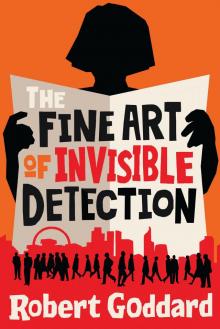 The Fine Art of Invisible Detection
The Fine Art of Invisible Detection One False Move
One False Move Panic Room
Panic Room Beyond Recall
Beyond Recall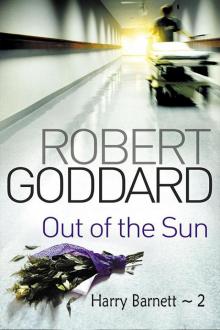 Out of the Sun
Out of the Sun In Pale Battalions - Retail
In Pale Battalions - Retail Painting The Darkness - Retail
Painting The Darkness - Retail The Corners of the Globe
The Corners of the Globe Name To a Face
Name To a Face Closed Circle
Closed Circle Caught In the Light
Caught In the Light Into the Blue
Into the Blue Past Caring - Retail
Past Caring - Retail Past Caring
Past Caring Hand In Glove - Retail
Hand In Glove - Retail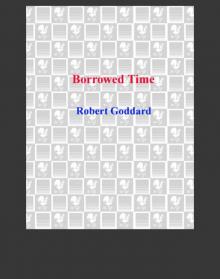 Borrowed Time
Borrowed Time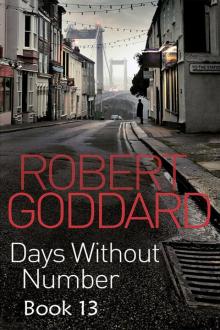 Days Without Number
Days Without Number James Maxted 03 The Ends of the Earth
James Maxted 03 The Ends of the Earth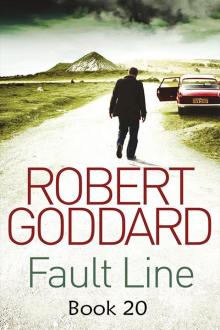 Fault Line - Retail
Fault Line - Retail Play to the End
Play to the End Sea Change
Sea Change Never Go Back
Never Go Back Take No Farewell - Retail
Take No Farewell - Retail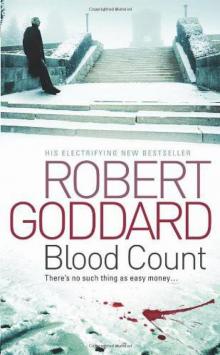 Blood Count
Blood Count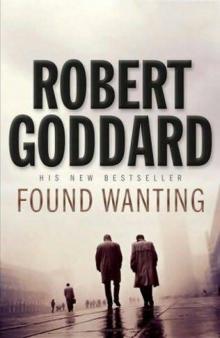 Found Wanting
Found Wanting Sight Unseen
Sight Unseen Hand in Glove
Hand in Glove The Ways of the World
The Ways of the World